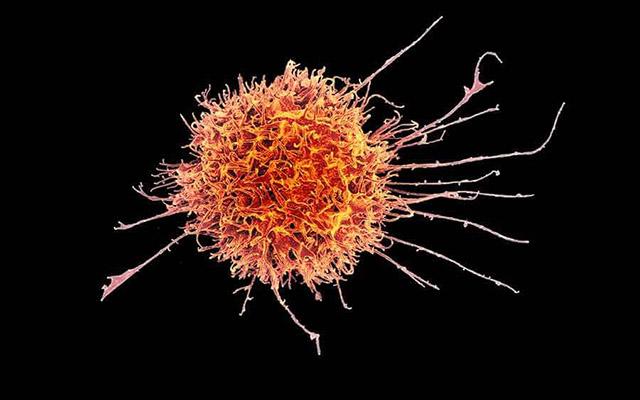Deleting an inhibitory gene in natural killer cells derived from induced pluripotent stem cells is found to boost their anti-tumor activity and persistence; researchers now seek to develop a clinical therapy

Credit: NIAID
Using induced pluripotent stem cells (iPSCs) and deleting a key gene, researchers at University of California San Diego School of Medicine have created natural killer cells — a type of immune cell — with measurably stronger activity against a form of leukemia, both in vivo and in vitro.
The findings are published in the June 11, 2020 online issue of Cell Stem Cell.
Natural killer (NK) cells are lymphocytes in the same family as T and B cells, and are part of the innate immune system. They circulate throughout the body and are among the first to respond to the presence of foreign cells or invaders, most notably viruses and early signs of cancer.
As such, they hold great promise as the basis for anticancer therapies, able to identify and target malignant cells, but their efficacy has proven limited.
In the new study, a research team led by senior author Dan Kaufman, MD, PhD, professor of medicine in the Division of Regenerative Medicine, director of cell therapy at UC San Diego School of Medicine and a faculty member of both the Sanford Consortium for Regenerative Medicine and the Sanford Stem Cell Clinical Center at UC San Diego Health, advanced their potential in two ways.
First, they created NK cells from IPSCs, which are derived from skin or blood cells that have been reprogrammed back to an embryonic-like pluripotent state and then directed to become NK cells. This strategy produces a standardized cell population, rather than needing to isolate cells on a patient-specific basis
Second, the researchers deleted a gene called CISH in the stem cell-derived NK cells. The CISH gene regulates expression of a protein that suppresses cytokine signaling. Cytokines are molecules that signal other immune system cells, such as macrophages, lymphocytes and fibroblasts to sites of infection, inflammation and trauma.
“Deletion of CISH in NK cells removes an internal ‘checkpoint’ that is normally activated or expressed when NK cells are stimulated by cytokines, such as IL15,” said Kaufman. “We found that CISH-deleted iPSC-derived NK cells were able to effectively cure mice that harbor human leukemia cells, whereas mice treated with the unmodified NK cells died from the leukemia.”
“These studies demonstrate that we can now edit iPSC-derived NK cells to remove an inhibitory gene inside the cell to improve activation of NK cells. We demonstrate that the CISH deletion improves NK cell function in at least two different ways. First, it removes a brake on IL15 signaling, with improves NK cell activation and function, even at low IL15 concentrations. Second, it leads to metabolic reprogramming of the NK cells. They become more efficient at energy utilization, which improves their function in vivo.”
Kaufman said he and colleagues are now working to translate the findings into a clinical therapy.
“As iPSC-derived NK cells are now in clinical trials to treat both hematologic (blood) malignancies and solid tumors, we expect that CISH-deleted iPSC-NK cells can provide an even more effective treatment.
“Importantly, iPSCs provide a stable platform for gene modification and since NK cells can be used as allogeneic cells that do not need to be matched to individual patients, we can create a line of appropriately modified iPSC-derived NK cells suitable for treating hundreds or thousands of patients as a standardized, ‘off-the-shelf’ therapy.”
###
Co-authors include: Huang Zhu, Robert H. Blum, Davide Bernareggi, Zhengming Wu, Zhipeng Meng, Chengsheng Wu, and Kun-Liang Guan, all at UC San Diego; and Eivind Heggernes Ask, Hanna Julie Hoel, and Karl-Johan Malmberg, all at Oslo University Hospital, Oslo, Norway.
Media Contact
Scott LaFee
[email protected]
Related Journal Article
http://dx.




